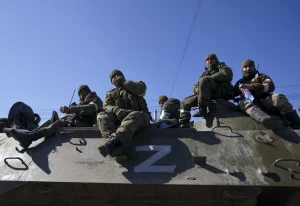
Ukraine’s top general says his county needs to prepare for worst case scenarios regarding Wagner in Belarus
Due to the arrival of Wagner PMCs in Belarus, Ukraine may have to consider a new threat to its northern border and take appropriate measures
Ukrainian Armed Forces Commander-in-Chief Valeriy Zaluzhnyi shared the information in an interview with the Washington Post.
According to him, Wagner PMC had already left the front line, so there were no noticeable changes on the battlefield during Prigozhin's mutiny.
"We didn't feel that their defense got weaker somewhere or anything," he said.
Zaluzhnyi does not rule out the possibility that Prigozhin's mercenaries who have moved to Belarus will pose a threat to northern Ukraine.
"I have a lot of fears, and Wagner is among them," the general said.
"And they’re not the only ones. If we start talking about it now, my head will spin. … Our task is to prepare for the worst and most possible scenarios. And we will try to minimize the possible consequences of what could be," he added.
Prigozhin's mutiny in Russia
For several months, there has been a conflict between Yevgeny Prigozhin, the financier of Wagner PMC, and the Russian Ministry of Defense. However, the situation escalated quickly on the evening of June 23.
Allegedly, Russian troops launched a missile attack on the Wagner base. Yevgeny Prigozhin, the leader of the Wagner PMC, announced a "march of justice" and stated that 25,000 mercenaries were heading to Moscow after the Russian leadership refused to hand over Defense Minister Sergei Shoigu and Chief of the General Staff Valery Gerasimov.
On June 24, Wagner’s fighters took control of Rostov-on-Don, where they initially gathered around the headquarters of the Southern Military District, and then entered the city of Voronezh. Their convoys, which had diverted from the Ukrainian border, were moving towards Moscow. Military aircraft and artillery under Shoigu's control attempted to stop them. The units of Wagner PMC were last spotted in the Lipetsk region. In Moscow itself, defensive positions were established, trenches were dug, and all security forces were mobilized.
However, on the evening of June 24, the press service of the self-proclaimed President of Belarus, Alexander Lukashenko, released a statement in which the head of the Wagner PMC stated that he was ready to stop the advance of his mercenaries' military convoys, which were already approaching Moscow, and to reach an agreement with the Kremlin. Prigozhin allegedly agreed on this during a conversation with Lukashenko.
Instead, Prigozhin announced that the Wagner group had stopped their advance and returned to their field camps before reaching 200 km from Moscow. He stated, "In a day, we traveled without reaching 200 km to Moscow. During this time, no blood was shed. However, the moment may come when blood will be spilled. Therefore, taking full responsibility, we are turning our columns around and heading back to the field camps as planned."
Subsequently, Prigozhin and all his fighters left the headquarters of Russia's Southern Military District. Russian leader Vladimir Putin promised that Prigozhin would be able to go to Belarus, and Russia would close the criminal case against him.
On June 26, Russian media reported that the leader of PMC Wagner remained under investigation in the case of organizing a coup in Russia, despite the Kremlin's statements about closing the case.
On the same day, Putin gave a speech in which he offered the Wagner PMC fighters three options for future actions: join the Russian Defense Forces, go to Belarus with other PMC members, or return to their families.
Meanwhile, Wagner leader, Yevgeny Prigozhin, said that the main goal of the mutiny was "to prevent the destruction of the Wagner PMC, not to overthrow the government" and called it a "march of justice." He also claimed that the offensive on Moscow had stopped because the mercenaries "did not want to shed much blood."
On June 27, the Federal Security Service of Russia announced the termination of a criminal case on armed rebellion involving the leader of Wagner PMC, Yevgeny Prigozhin.
The Russian Ministry of Defense claimed that Wagner mercenaries would hand over heavy equipment to the regular Russian army.
On the same day, the self-proclaimed president of Belarus confirmed Yevgeny Prigozhin arrived in the country. According to him, the Wagner fighters who arrived with him will not guard the Russian tactical nuclear weapons deployed there.
Read more on the events here.
- News












































